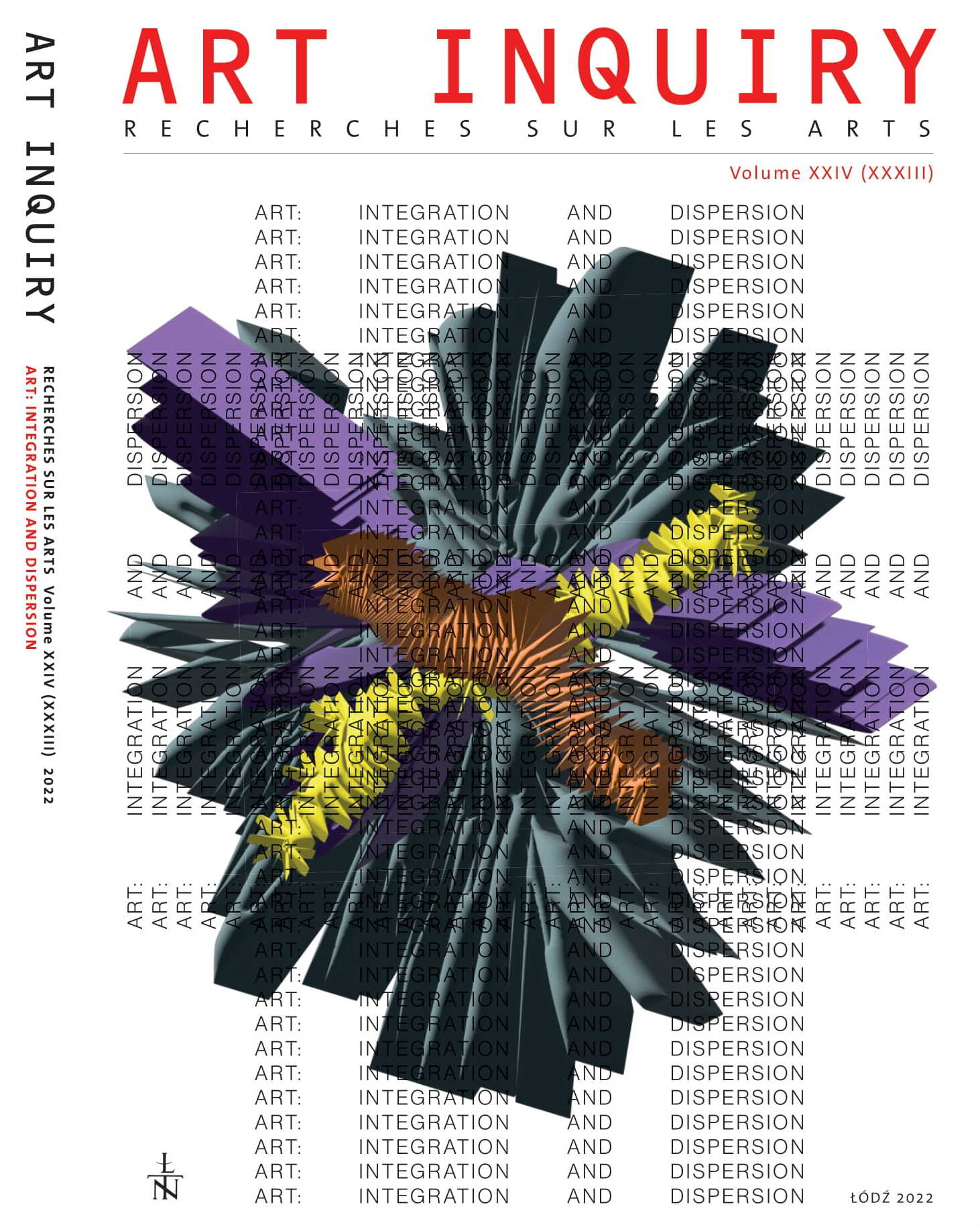Strategies of Scattering and Dislocation of a Letter in Ewa Partum's Performances
DOI:
https://doi.org/10.26485/AI/2022/24/9Keywords:
Polish art, active poetry, performance, postcolonialism, feminism, the artistic strategy of dislocation and dispersalAbstract
Artistic activities with a letter remain, in a way, on the margins of academic focuses, as they reveal themselves on the boundary of several disciplines: literature, concrete poetry, typography, performance or conceptual art. In this article, I focus on the use of the dislocation strategy and scattering of a letter on the example of Ewa Partum's selected performances, such as: The Poetic License Area, poem by ewa, or Active Poetry. Ulysses J. Joyce. In this analysis, I draw upon the following theoretical anchors: the great theory of literacy, functions of signs indicated by Derrida, which I applied to search for the potential of letters as signs, and the deepening of a feminist perspective with a postcolonial research spectrum. The research perspective presented in this article allowed me to extract new meanings hiding in a letter, which resulted in Ewa Partum's performances being reinterpreted. The text is divided according to the leading aspects related to the applied strategy of scattering: spreading (around), sowing (around), moving (around) and sending (around).
References
Ashcroft Bill, Griffiths Gareth, Tiffin Helen (2007), Post-colonial studies: the key concepts, London–New York: Routledge.
Barthes Roland (1967), The Death of the Author, transl. Richard Howard, "Aspen" no. 5-6, transl. R. Howard.
Barthes Roland (1999) Śmierć autora, transl. M.P. Markowski, "Teksty Drugie" 1999, no. 1/2 (54/55), pp. 247-251.
Cavanagh Clare (2003) Postkolonialna Polska. Biała plama na mapie współczesnej teorii (Postco-lonial Poland: An Empty Space on the Map of Current Theory), transl. T. Kunz, "Teksty Drugie" no. 2-3, pp. 60-71.
Chevrier Jean-François (2015) Wiersze Ewy nagiej i zwielokrotnionej = Poems by Ewa naked and multiple, [in:] M. Morzuch ed., Ewa Partum. Nic nie zatrzyma idei sztuki = Nothing stops the idea of art, Łódź: Muzeum Sztuki w Łodzi, pp. 4-10; 48-54.
Derrida Jacques (1978), Różnia (Différance), transl. J. Skoczylas [in:] M.J. Siemek ed., Drogi współczesnej filozofii, Czytelnik, Warszawa, pp. 374-411.
Derrida Jacques (1986) Parages, Paris: Galilée.
Encyclopedia PWN source: https://encyklopedia.pwn.pl/haslo/kolonializm;3924014.html [acces¬sed: 30.01.2022]
Golka Marian (2009) Polska transformacja w perspektywie postkolonialne (Polish Transformation from the Post-Colonial Perspective), "Ruch Prawniczy, Ekonomiczny i Socjologiczny" Vol. LXXI, no. 2, pp. 439-456.
Gorządek Ewa (2015) Ewa Partum, http://culture.pl/pl/tworca/ewa-partum. [accessed: 30.01.2022]
Howorus-Czajka Magdalena (2019) Tropami wielokrotności. Strategie powtórzenia w sztuce polskiej lat 60. i 70. XX wieku (On the Trail of Multiplicity. Repetition Strategies in Polish Art of the 1960s and 1970s), Gdańsk: Wydawnictwo UG.
Hussakowska Maria, (2012) Czy polska sztuka konceptualna ma płeć?, "Sztuka i Dokumentacja", no. 6, pp. 29-39.
Idziak Urszula (2011) Dziedzictwo śmierci — Ricoeur i Derrida, "Argument", no. 2, pp. 291-300.
Jakubowska Agata (2018) Globalizing East European Art Histories: Past and Present, Routledge.
Kałuża Anna (2019), Materialność poezji: słowa i ciała / słowa i obrazy (Materiality of Poetry: Words and Bodies) (Ewa Partum, Andrzej Tobis, Adam Kaczanowski), "Praktyka Teoretyczna" no. 34(4), pp. 131-150.
Kępińska Alicja (1981) Nowa sztuka – sztuka polska, Warszawa: Wydawnictwa Artystyczne i Filmowe.
Majewska Ewa (2012) Postkolonializm w Polsce – propozycja feministyczna (Postcolonialism in Poland – a feminist proposition), "Przegląd Kulturoznawczy" no. 4, pp. 335-353.
Majewska Karolina (2014) O uhistorycznianiu konceptualizmu i interpretacji feminizmu. Rozmowa z Ewą Partum, "Obieg", http://archiwum-obieg.u-jazdowski.pl/teksty/31875 [accessed 30.01.2022]
Majewska-Güde Karolina (2019) Ewa Partum: poem by ewa [pref.], 13.04.-01.06.2019, Hunt Kastner Gallery, Prague, Czech Republic, source: http://huntkastner.com/exhibitions/past/ewa-partum-poem-by-ewa/ [accessed: 26.01.2022].
Mazurczak Witold (2016) Kolonializm – Dekolonizacja – Postkolonializm. Rozważania o istocie i periodyzacji (Colonialism – Decolonization – Post-colonialism. Considerations on the essence and periodization), "Przegląd Politologiczny" no. 3, pp. 131-144.
McLuhan Marshal (1975) J. Fuksiewicz ed., Wybór pism, transl. K. Jakubowicz, Warszawa: Wydawnictwa Artystyczne i Filmowe.
Monkiewicz Dorota (2012–2013) (Jej) ciało i tekst. Fragmenty / (Her) Body and Text. Fragments in: Ewa Partum, A. Szyłak, B. Partum, E. M. Tatar eds., Gdańsk: Instytut Sztuki Wyspa & Fundacja Wyspa Progress, pp. 74-91.
Monkiewicz Dorota (2014), O funkcjonowaniu międzynarodowej sieci wymiany artystycznej w Polsce na przykładzie Galerii Adres w Łodzi = On the international artistic exchange network in Poland as illustrated by the example of Łódź’s Adres Gallery, [in:] M. Morzuch ed., Ewa Partum. Nic nie zatrzyma idei sztuki = Nothing stops the idea of art, Łódź: Muzeum Sztuki w Łodzi, pp. 12-26; 56-58.
Nabakowski Gislind, (2006) Nieprzyjemne poczucie maskarady. Droga "literowej milionerki" Ewy Partum do poezji konceptualnej i feministycznej tematyki gender (Letter Milionaire – Apprehension and Masquerade. Ewa Partum’s Path to Conceptual Poetry and Feminist Gender Theory) [in:] Ewa Partum 1965–2001, D. Monkiewicz ed., Warszawa: Muzeum Narodowe, pp 16-26.
Osterhammel Jürgen (1995) Kolonialismus, München: Beck.
Parashar Swati (2016) Feminism and Postcolonialism, "(En)gendering Encounters, Postcolonial Studies", Vol. 19, Issue 4: Feminism Meets Postcolonialism: Rethinking Gender, State and Political Violence, pp. 371-377.
Skarbiec imion polskich (The Thesaurus of Polish Names) (2005) L. Lewoc ed., Wydawnictwo Europa Wrocław, p. 80.
Spivak Gayatri Chakravorty (1990) The Post-colonial Critic: Interviews, Strategies, Dialogues, ed. S. Harasym, New York: Routledge.
Stepken Angelika (2012–2013) Monografia twórczości (Monograph of the Works) in: Ewa Partum, A. Szyłak, B. Partum, E. M. Tatar eds, Gdańsk: Instytut Sztuki Wyspa & Fundacja Wyspa Progress.
Turowski Andrzej (2012–2013) Wielkość pragnienia. O konceptualizmie feministycznym Ewy Partum w latach siedemdziesiątych (The Greatness of Desire: On the Feminist Conceptualism of Ewa Partum in the 1970s), [in:] Ewa Partum, A. Szyłak, B. Partum, E. M. Tatar eds., Gdańsk: Instytut Sztuki Wyspa & Fundacja Wyspa Progress.
Załuski Tomasz (2018) Kobieta walcząca o pozycję w polu produkcji artystycznej. Samoidentyfkacja, samoorganizacja i samoemancypacja według Ewy Partum. [A Woman Fighting for Her Position in the Field of Art Production. Self-identification, Self-organization and Self-emancipation According to Ewa Partum], "Zagadnienia Rodzajów Literackich" Vol. LXI, no. 2, pp. 78-89.



